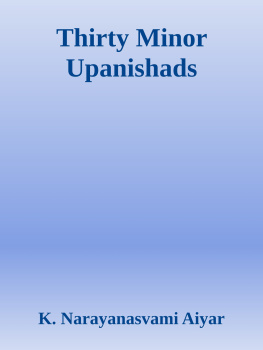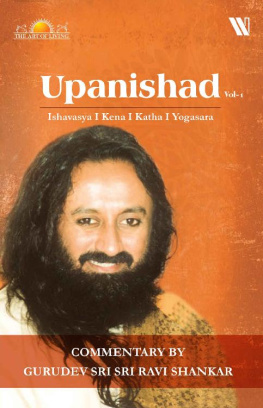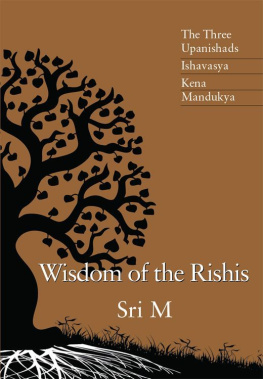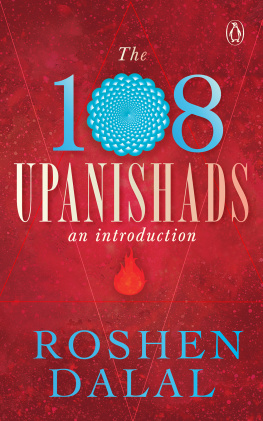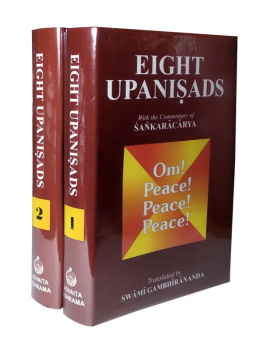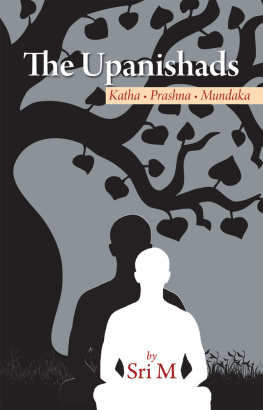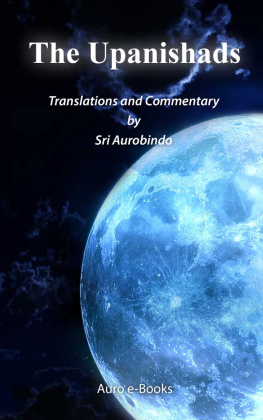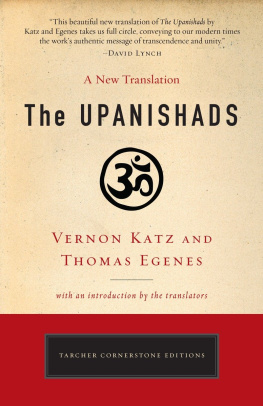K. Narayanasvami Aiyar (tr.) - Thirty Minor Upanishads
Here you can read online K. Narayanasvami Aiyar (tr.) - Thirty Minor Upanishads full text of the book (entire story) in english for free. Download pdf and epub, get meaning, cover and reviews about this ebook. genre: Religion. Description of the work, (preface) as well as reviews are available. Best literature library LitArk.com created for fans of good reading and offers a wide selection of genres:
Romance novel
Science fiction
Adventure
Detective
Science
History
Home and family
Prose
Art
Politics
Computer
Non-fiction
Religion
Business
Children
Humor
Choose a favorite category and find really read worthwhile books. Enjoy immersion in the world of imagination, feel the emotions of the characters or learn something new for yourself, make an fascinating discovery.
- Book:Thirty Minor Upanishads
- Author:
- Genre:
- Rating:4 / 5
- Favourites:Add to favourites
- Your mark:
- 80
- 1
- 2
- 3
- 4
- 5
Thirty Minor Upanishads: summary, description and annotation
We offer to read an annotation, description, summary or preface (depends on what the author of the book "Thirty Minor Upanishads" wrote himself). If you haven't found the necessary information about the book — write in the comments, we will try to find it.
Thirty Minor Upanishads — read online for free the complete book (whole text) full work
Below is the text of the book, divided by pages. System saving the place of the last page read, allows you to conveniently read the book "Thirty Minor Upanishads" online for free, without having to search again every time where you left off. Put a bookmark, and you can go to the page where you finished reading at any time.
Font size:
Interval:
Bookmark:
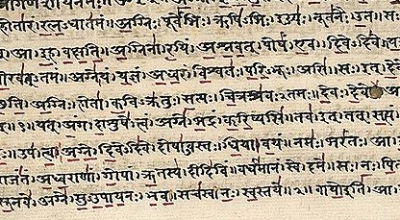 |
Thirty Minor Upanishads tr. by K. Narayanasvami Aiyar [1914] |
This is a selection of translations from the 'minor' Upanishads.These are texts which have been incorporated into the list of 108Upanishads, principally dealing with Yogic philosophy and practices.They describe some very esoteric concepts, and enumerate Hindutechnical terminology in great detail.
ContentsForeword1. Muktikopanishad of Shukla-Yajurveda2. Sarvasara-Upanishad of Krshna-Yajurveda3. Niralamba-Upanishad of Shukla-Yajurveda4. Maitreya-Upanishad of Samaveda5. Kaivalya-Upanishad of Krshna-Yajurveda6. Amrtabindu-Upanishad of Krshna-Yajurveda7. Atmabodha-Upanishad of Rgveda8. Skanda-Upanishad of Krshna-Yajurveda9. Paingala-Upanishad of Shukla-Yajurveda10. Adhyatma-Upanishad of Shukla-Yajurveda11. Subala-Upanishad of Shukla-Yajurveda12. Tejobindu-Upanishad of Krshna-Yajurveda13. Brahmopanishad of Krshna-Yajurveda14. Vajrasuchi-Upanishad of Samaveda15. Shariraka-Upanishad of Krshna-Yajurveda16. Garbha-Upanishad of Krshna-Yajurveda17. Tarasara-Upanishad of Shukla-Yajurveda18. Narayana-Upanishad of Krshna-Yajurveda19. Kalisantarana Upanishad of Krshna-Yajurveda20. Bhikshuka-Upanishad of Shukla-Yajurveda21. Naradaparivrajaka-Upanishad of Atharvanaveda22. Shandilya-Upanishad of Atharvanaveda23. Yogatattva-Upanishad of Krshna-Yajurveda24. Dhyanabindu-Upanishad of Samaveda25. Hamsa-Upanishad of Shukla-Yajurveda26. Amrtanada-Upanishad of Krshna-Yajurveda27. Varaha-Upanishad of Krshna-Yajurveda28. Mandalabrahmana-Upanishad of Shukla-Yajurveda29. Nadabindu-Upanishad of Rgveda30. Yogakundali-Upanishad of Krshna-YajurvedaIndex of Proper Names
Scanned, proofed and formatted at sacred-texts.com by John Bruno Hare, November 2009. This text is in the public domain in the US because it was published prior to 1923.
TO
THE RSHIS OF INDIA
WHO BY TREADING THE PATH
OF
THE UPANISHADS HAVE PERFECTED THEMSELVES
AND
REALISED THE GOAL
THIS HUMBLE EFFORT
To spread Their Ancient Teachings in a Modern Garb
IS DEDICATED
BY ONE
WHO LOVES AND WORSHIPS THEM
And tries to walk in Their Footsteps
As Their Humble and Devoted Disciple
PAGE |
I. VEDANTA-UPANISHADS: |
1. Muktikopanishad of Shukla-Yajurveda |
2. Sarvasara-Upanishad of Krshna-Yajurveda |
3. Niralamba-Upanishad of Shukla-Yajurveda |
4. Maitreya-Upanishad of Samaveda |
5. Kaivalya-Upanishad of Krshna-Yajurveda |
6. Amrtabindu-Upanishad Do. |
7. Atmabodha-Upanishad of Rgveda |
8. Skanda-Upanishad of Krshna-Yajurveda |
9. Paingala-Upanishad of Shukla-Yajurveda |
10. Adhyatma-Upanishad Do. |
11. Subala-Upanishad Do. |
12. Tejobindu-Upanishad of Krshna-Yajurveda |
13. Brahmopanishad Do. |
14. Vajrasuchi-Upanishad of Samaveda |
II. PHYSIOLOGICAL UPANISHADS: |
15. Shariraka-Upanishad of Krshna-Yajurveda |
16. Garbha-Upanishad Do. |
PAGE |
III. MANTRA-UPANISHADS: |
17. Tarasara-Upanishad of Shukla-Yajurveda |
18. Narayana-Upanishad of Krshna-Yajurveda |
19. Kalisantarana-Upanishad Do. |
IV. SANNYASA-UPANISHADS: |
20. Bhikshuka-Upanishad of Shukla-Yajurveda |
21. Naradaparivrajaka-Upanishad of Atharvanaveda |
V. YOGA-UPANISHADS: |
22. Shandilya-Upanishad of Atharvanaveda |
23. Yogatattva-Upanishad of Krshna-Yajurveda |
24. Dhyanabindu-Upanishad of Samaveda |
25. Hamsa-Upanishad of Shukla-Yajurveda |
26. Amrtanada-Upanishad of Krshna-Yajurveda |
27. Varaha-Upanishad Do. |
28. Mandalabrahmana-Upanishad of Shukla-Yajurveda |
29. Nadabindu-Upanishad of Rgveda |
30. Yogakundali-Upanishad of Krshna-Yajurveda |
INDEX |
FOR the first time it is, I believe, that the English translation of so many as 30 Upanishads is being put forth before the public in a collected form. Among the Hindu Scriptures, the Vedas hold the pre-eminent place. The Upanishads which are culled from the Aranyaka-portions of the Vedasso-called because they were read in the Aranya (forest) after the learner had given up the life of the worldare regarded as the Vedanta, or the end or final crown of the Vedas. Vedanta is also the end of all knowledge, since the word Vedas means according to its derivation 'knowledge'. Rightly were the Upanishads so considered, since their knowledge led a person to Atma, the goal of life. The other portion of the Vedas, viz., Samhitas and Brahmanas, conferred upon a man, if he should conform to the requisite conditions, the mastery of the Universe only which is certainly inferior to Atma. It is these Upanishads that to the western philosopher Schopenhauer were the "solace of life".
There are now extant, in all, 108 Upanishads, of which the principal or major 12 Upanishads commented upon by Shri Shankaracharya and others were translated into English by Dr. Roer and Raja Rajendra Lal Mitra and re-translated by Max Muller in his "Sacred Books of the East," together with one other Upanishad called Maitrayani. Of the rest, 95 in number, two or three Upanishads have appeared in English up to now, but never so many as are here presented to the public, so far as I am aware.
Many years ago, the late Sundara Shastri, a good Sanscrit Scholar and myself worked together to put into English garb the Upanishads that had not been attempted before, and
succeeded in publishing most of those which are here gathered in the monthly issues of The Theosophist. The Karmic agents willed that my late co-worker should abandon his physical garment at a premature age. Then I resolved upon throwing up my worldly business of pleading the cause of clients before the bench for that of pleading the cause of God before the public. The incessant travel in that cause since then for over 18 years from place to place in all parts of India left me no leisure until now to republish all the above translations in a book form. But when this year a little rest was afforded me, I was able to revise them as well as add a few more. I am conscious of the many faults from which this book suffers and have no other hope in it than that it will serve as a piece of pioneer work, which may induce real Yogins and scholars to come into the field and bring out a better translation.
There are many editions of the Upanishads to be found in Calcutta, Bombay, Poona, South India and other places. But we found that the South Indian editions, which were nearly the same in Telugu or Grantha characters, were in many cases fuller and more intelligible and significant. Hence we adopted for our translation South Indian editions. The edition of the 108 Upanishads which the late Tukaram Tatya of Bombay has published in Devanagari characters approaches the South Indian edition. As the South Indian edition of the Upanishads is not available for the study of all, I intend to have the recensions of that edition printed in Devanagari characters, so that even those that have a little knowledge of Sanscrit may be able to follow the original with the help of this translation.
Font size:
Interval:
Bookmark:
Similar books «Thirty Minor Upanishads»
Look at similar books to Thirty Minor Upanishads. We have selected literature similar in name and meaning in the hope of providing readers with more options to find new, interesting, not yet read works.
Discussion, reviews of the book Thirty Minor Upanishads and just readers' own opinions. Leave your comments, write what you think about the work, its meaning or the main characters. Specify what exactly you liked and what you didn't like, and why you think so.

